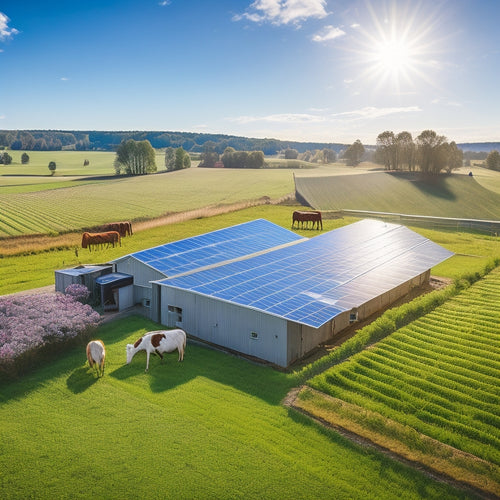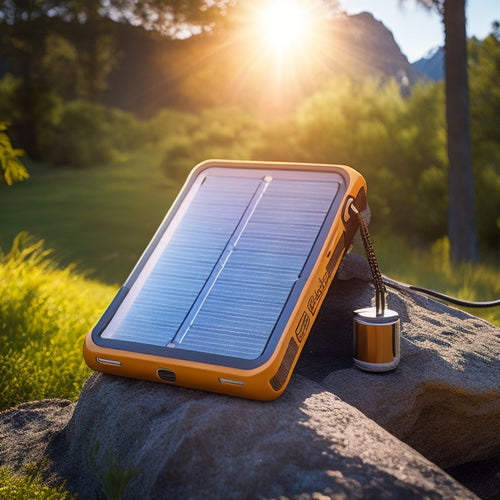
Small Solar
Share
You're looking for a portable power solution that's perfect for camping, hiking, or off-grid living. Small solar panels offer just that, with compact designs that are considerably lighter than traditional counterparts, making them easy to transport and install. They integrate easily with energy storage systems, providing reliable power in various weather conditions while reducing environmental impact. With high-efficiency solar cells maximizing energy output, you can generate your own electricity and reduce reliance on the grid. From wattage to voltage, understanding the specifications of small solar panels is key - and that's just the start of revealing their full potential.
The Essentials
- Small solar panels offer a portable power solution ideal for outdoor activities, camping, and off-grid destinations.
- Compact designs integrate easily with energy storage systems, perfect for off-grid living and urban applications.
- High-efficiency solar cells maximize energy output in small systems, utilizing thin film technology to enhance performance.
- Small solar systems allow for reduction of grid reliance, generating own electricity and providing control over energy usage.
- Wattage and voltage specifications vary across solar panel models, requiring an energy audit to determine specific energy needs.
Portability in Small Size
You're looking for a portable power solution that's easy to carry around, and small solar panels fit the bill.
Their compact design makes them lightweight and convenient to transport, allowing you to take them wherever you need a reliable power source.
Plus, they eliminate the risk of dead batteries while camping or hiking by providing a portable and reliable source of power renewable energy solution.
With a small solar panel, you can generate power on the go without being weighed down by bulky equipment.
Easy to Carry Around
With their compact design, small solar panels fit neatly into backpacks or luggage, making them easy to transport to remote areas or campsites, and allowing you to employ renewable energy on-the-go. This portability opens up a world of possibilities for outdoor excursions, emergency preparedness, and sustainable travel.
| Application | Benefit | Description |
|---|---|---|
| Camping | Lightweight designs | Small solar panels provide energy on the go, powering camping essentials like lights and communication devices. |
| Travel | Travel convenience | Portable applications enable you to stay connected and powered while discovering off-grid destinations. |
| Emergency | Emergency preparedness | Compact solar panels offer a reliable source of energy during power outages or natural disasters. |
As you journey off the grid, small solar panels provide the freedom to roam without worrying about energy constraints. Their versatility and compact size make them an essential component of any outdoor excursion or emergency preparedness kit. With small solar panels, you can capture the power of the sun whenever and wherever you need it, ensuring a sustainable and convenient travel experience.
Compact Power Solution
Each small solar panel is carefully designed to pack a significant amount of power into a remarkably compact size, making it an ideal compact power solution for various applications. You can utilize the power of sustainable energy with these innovative solar innovations, perfect for off-grid living and urban applications.
The compact design allows for easy integration with energy storage systems, providing a reliable source of renewable resources. These portable solar panels address common concerns such as reliability and efficiency in varying weather conditions, space constraints, and high upfront costs, making them an attractive option for those seeking to minimize their environmental impact.
These eco-friendly solutions offer a significant reduction in environmental impact, making them an attractive option for those seeking to minimize their carbon footprint. By leveraging the power of small solar panels, you can enjoy cost savings and independence from traditional energy sources.
Whether you're an outdoor enthusiast or a city dweller, these compact power solutions provide the freedom to live life on your own terms. With the ability to generate clean energy anywhere, anytime, you can experience the thrill of off-grid living without sacrificing convenience or comfort.
Increased Energy Independence
You'll find that small solar systems enable you to reduce your reliance on the grid, allowing you to control your energy usage and costs.
By generating your own energy, you'll have more control over your local energy needs, reducing your dependence on external power sources.
With the help of residential solar panels, you can capture renewable energy and save on electricity bills.
This, in turn, gives you the freedom to manage your energy usage more effectively, making you more energy independent.
Reduced Reliance Grid
How much control do you want over your energy consumption? With small solar, you can reduce your reliance on the grid and take charge of your energy usage. By generating your own electricity, you'll enjoy energy savings and contribute to grid stability.
Reducing your reliance on the grid means you're less dependent on external power sources, which can be unpredictable and unreliable. You'll have more autonomy over your energy consumption, allowing you to make conscious decisions about your usage.
This independence also enables you to prioritize your energy needs, ensuring you have power when you need it most.
In addition, decentralized energy production through small solar contributes to a more resilient grid. By generating your own electricity, you're reducing the strain on the grid during peak hours, helping to prevent blackouts and brownouts.
This not only benefits you but also the entire community, as a more stable grid means fewer power outages and a more reliable energy supply.
Local Energy Control
With small solar, your energy independence grows exponentially as you take localized control of your power needs. By leveraging local resources, you can manage your energy consumption more efficiently, reducing your reliance on the grid. This localized approach enables you to make the most of community initiatives and sustainability practices that promote renewable investments.
| Benefits | Features | Advantages |
|---|---|---|
| Energy Management | Local Energy Control | Increased Energy Independence |
| Sustainability Practices | Community Initiatives | Reduced Environmental Impact |
| Renewable Investments | Energy Storage | Grid Integration and Policy Incentives |
| Technological Advancements | Advanced Energy Management | Enhanced Energy Efficiency |
As you take control of your energy needs, you'll notice a significant reduction in your environmental impact. By integrating energy storage and grid integration, you'll be able to optimize your energy consumption, reducing your reliance on non-renewable sources. With policy incentives and technological advancements, the benefits of small solar become even more persuasive, allowing you to enjoy the freedom and independence that comes with localized energy control.
High-Efficiency Solar Cells
You're likely familiar with the importance of maximizing energy output in small-scale solar systems.
With the rising demand for renewable energy, high-efficiency solar cells can greatly enhance your system's overall performance, especially in residential solar energy systems.
Two key factors contribute to their exceptional capabilities: thin film technology and maximum power output.
Thin Film Technology
Thin film technology has emerged as a breakthrough in the development of high-efficiency solar cells, enabling the deposition of photovoltaic materials on a substrate in extremely thin layers, typically measuring mere micrometers.
This approach offers several advantages, including reduced material usage and lower production costs, making it a cost-efficient option. The thin film advantages also extend to environmental impact, as it reduces waste and energy consumption during manufacturing processes.
Additionally, thin film technology enables more efficient energy conversion, resulting in higher power output. Durability factors are also improved, as the thin layers are less prone to mechanical stress and degradation.
This technology's application versatility is vast, ranging from building-integrated photovoltaics to portable solar panels. Market trends suggest that thin film technology is gaining traction, and installation techniques are becoming more streamlined.
As technology advancements continue, you can expect even more efficient and affordable solar energy solutions.
Maximum Power Output
High-efficiency solar cells are engineered to maximize power output, utilizing advanced materials and designs to convert sunlight into electrical energy with unparalleled efficiency. By optimizing energy conversion, you can generate more power from a smaller surface area, making high-efficiency solar cells ideal for small-scale solar applications.
| Solar Cell Type | Solar Efficiency (%) | Power Output (W) |
|---|---|---|
| Monocrystalline Silicon | 22.8 | 400 |
| Polycrystalline Silicon | 20.5 | 350 |
| Thin-Film Amorphous | 14.2 | 250 |
| Bifacial Solar Cells | 25.5 | 450 |
These high-efficiency solar cells achieve extraordinary solar efficiency, with some models reaching up to 25.5%. This means you can generate more electricity from the same amount of sunlight, reducing your reliance on traditional energy sources and increasing your energy independence. By choosing high-efficiency solar cells, you're taking a significant step towards utilizing the full potential of solar energy.
Check Wattage and Voltage
You need to verify the solar panel's wattage, which is typically rated under standard test conditions (STC).
The power output rating indicates the maximum power the panel can produce, usually expressed in watts (W).
To guarantee you're getting the right fit for your home, consider conducting an energy audit to determine your energy needs, and then choose a panel that meets those requirements.
When checking the wattage, confirm it matches your system's requirements to avoid undersizing or oversizing the panel.
Solar Panel Wattage
Since your solar panel system's performance relies heavily on its ability to generate power, understanding the wattage and voltage of your solar panels is essential. Wattage, measured in watts (W), represents the maximum power output of your solar panel under ideal conditions. Voltage, measured in volts (V), determines the electrical potential of your solar panel.
| Wattage (W) | Voltage (V) | Solar Efficiency |
|---|---|---|
| 250 | 30 | 18.5% |
| 300 | 32 | 19.2% |
| 350 | 34 | 20.1% |
When selecting solar panels, consider the wattage and voltage that align with your energy storage needs. Higher wattage solar panels are ideal for larger energy storage systems, while lower wattage panels are better suited for smaller systems. Additionally, optimizing your solar panel configuration can improve solar efficiency, leading to increased energy production and reduced reliance on traditional power sources.
Power Output Ratings
Across various solar panel models, power output ratings vary greatly, with wattage and voltage being the primary factors influencing overall performance. You need to check these ratings to guarantee you're getting the right amount of power for your specific needs.
When evaluating power output ratings, you'll want to take into account two key performance metrics: wattage and voltage. Wattage measures the solar panel's maximum power output, typically ranging from 50 to 400 watts.
Voltage, on the other hand, measures the electrical potential difference between the panel's positive and negative terminals, usually between 12 and 48 volts.
A higher wattage rating generally indicates higher solar efficiency, but it's crucial to take into account voltage as well. A higher voltage rating can result in lower energy losses during transmission, making it more efficient.
When selecting a solar panel, consider your specific energy requirements and choose a model that balances wattage and voltage to optimize performance. By doing so, you'll be able to utilize the full potential of solar energy and enjoy the freedom that comes with it.
Lighter Than Traditional Panels
You'll find that small solar panels are markedly lighter than their traditional counterparts, which can reduce installation complexity and costs.
By using advanced materials and design techniques, manufacturers have managed to shave off a substantial amount of weight without compromising performance.
This weight reduction brings several benefits, including easier handling and transportation, as well as reduced structural requirements for rooftops and mounting systems.
Weight Reduction Benefits
Your solar panel installation benefits from Small Solar's innovative design, which slashes weight by a significant margin compared to traditional panels. This reduction in weight yields several advantages, primarily in the area of cost savings.
With lighter panels, you'll require less substantial mounting infrastructure, reducing material costs and labor expenses. Additionally, the decreased weight lowers the risk of structural damage to your roof, thereby minimizing potential repair costs.
The environmental impact of Small Solar's weight reduction is also significant. Lighter panels necessitate fewer resources for transportation, resulting in a smaller carbon footprint. This, in turn, contributes to a more sustainable and eco-friendly solar solution.
Moreover, the reduced weight enables easier handling and installation, streamlining the entire process and reducing the likelihood of accidents. By choosing Small Solar, you're not only saving money but also promoting a more environmentally conscious approach to renewable energy.
Frequently Asked Questions
Can I Install Small Solar Panels on My Own?
You can install solar panels on your own, but be aware of DIY installation challenges, ensuring safety considerations, and optimizing panel placement for maximum cost savings and system efficiency, while following maintenance tips for long-term freedom from energy bills.
Are Small Solar Panels Suitable for Indoor Use?
Crafting creative indoor spaces, you'll find that photovoltaic panels can thrive inside, but their efficiency hinges on ideal placement, ensuring sufficient sunlight exposure for indoor solar applications, which small panel efficiency can still provide, albeit with limited power output.
Can I Connect Multiple Small Solar Panels Together?
You can connect multiple solar panels together to increase power output, using either a series connection to elevate voltage or a parallel connection to enhance current, ensuring a reliable and efficient energy supply for your freedom-seeking pursuits.
Do Small Solar Panels Work Well in Low-Light Conditions?
You might think low-light conditions hinder solar panel efficiency, but modern solar panel technology has improved dramatically, allowing you to capture power even on cloudy days, making small solar panels a reliable choice for your off-grid excursions.
Are Small Solar Panels Compatible With Standard Inverters?
When choosing an inverter, you'll find most standard models are compatible with small solar panels, ensuring efficient energy conversion; however, it's vital to verify the inverter's specifications to maximize small solar efficiency and optimize inverter compatibility.
Final Thoughts
You've got the power of the sun in the palm of your hand with small solar panels. Their minuscule size is a marvel, allowing you to take them anywhere and still harvest a tremendous amount of energy. With these tiny titans, you'll be a million miles ahead regarding energy independence. So, go ahead and soak up the sun's rays - your devices will thank you!
Related Posts
-

What Do I Need to Know About Farm Solar Panels
When considering farm solar panels, you need to assess costs, benefits, and technical specifics. Initial investment c...
-

Fastest Solar Chargers for Emergency Power
When choosing the fastest solar chargers for emergency power, you need to focus on features like rapid charging capab...
-

Solar Powered Lights for Sustainable Home Decor
Solar-powered lights offer a stylish and eco-friendly way to enhance your home decor. They capture sunlight, converti...


